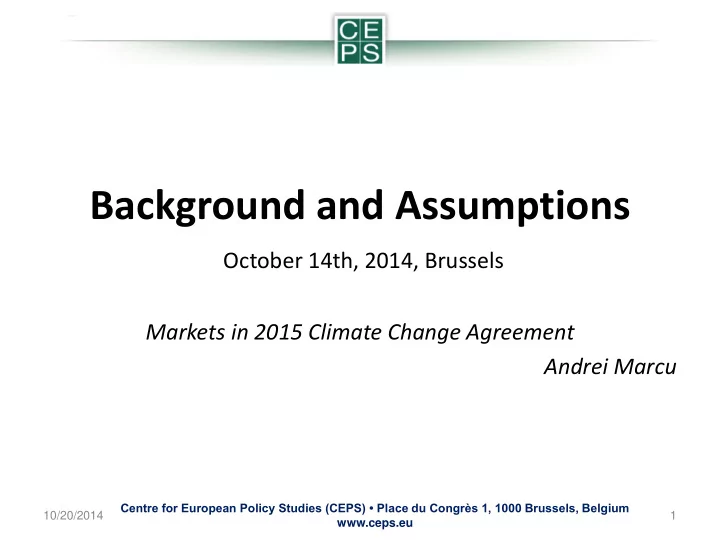

Background and Assumptions October 14th, 2014, Brussels Markets in 2015 Climate Change Agreement Andrei Marcu Centre for European Policy Studies (CEPS) • Place du Congrès 1, 1000 Brussels, Belgium 10/20/2014 1 www.ceps.eu
Moving beyond Kyoto • KP is Cartesian, logic and orderly – a giant cap-and-trade system – Units with clear compliance value – Tracking through ITL – No double counting possible – Transfers for UNFCCC compliance • World has changed – Different economic order – Different emissions pattern – Different appetite for global governance – Many domestic market-based approaches to CC mitigation have developed Centre for European Policy Studies (CEPS) • Place du Congrès 1, 1000 Brussels, Belgium 10/20/20 2 14 www.ceps.eu
Moving beyond Kyoto • Copenhagen tried to duplicate a KP and failed • Hence, demand for an agreement capable of facilitating a heterogeneous, less-centralised landscape, with ‘various approaches’ • Paris agreement unclear but assumptions on the agreement and the world to 2020 and beyond must be made • All discussions depend on assumptions and scenarios Centre for European Policy Studies (CEPS) • Place du Congrès 1, 1000 Brussels, Belgium 10/20/20 3 14 www.ceps.eu
Assumptions • New international climate change agreement in Paris • All Parties will have INDCs – Economy-wide with absolute caps (not dissimilar to KP commitments, but without – AAU budget) – Sub-national level with absolute caps (e.g. sectors of the economy, sub-national – regions) – Without absolute caps Centre for European Policy Studies (CEPS) • Place du Congrès 1, 1000 Brussels, Belgium 10/20/20 4 14 www.ceps.eu
Assumptions • There will be a desire to transfer mitigation outcomes/units -- “good for compliance” with their INDCs. • Different types of mitigation instruments/approaches/market mechanisms – Developed, created and operated by the COP (e.g. CDM, JI). New ones may emerge in this category – Created and operated by Parties (or NOT by the COP). Centre for European Policy Studies (CEPS) • Place du Congrès 1, 1000 Brussels, Belgium 10/20/20 5 14 www.ceps.eu
Lessons from KP • UNFCCC run market infrastructure was major benefit • Clarity of compliance value and market value. Principle of ‘regulator decides’: the regulator decides what the environmental value of a unit is and how it provides recognition • Unclear objectives & politicization • Carbon leakage: asymmetric CC-provisions lead to competitiveness pressures from asymmetrical climate change policies • Regulatory and political stability for credibility and long- term proice signal Centre for European Policy Studies (CEPS) • Place du Congrès 1, 1000 Brussels, Belgium 10/20/20 6 14 www.ceps.eu
Scenarios • Broadly decentralised climate change regime – Each country can use any international unit for compliance – No global standards: minimalistic market provisions in Agreement • Decentralised regime with minimum standards – Guidance on minimum environmental standards for compliance, but no approval • Transparency approach: formal minimum standards – Minimum environmental standards must be observed, but no approval process • Centralised regime: COP as key regulator – COP defines environmental standards which must be observed – Units, or systems producing units, must be approved by C Centre for European Policy Studies (CEPS) • Place du Congrès 1, 1000 Brussels, Belgium 10/20/20 7 14 www.ceps.eu
Market development scenarios • Scenario 1: ‘Mission Impossible’ or ‘Super KP’ • Scenario 2: Cartesian scenario: UNFCCC-linked carbon markets • Scenario 3: Globally Networked Carbon Market s Main question to be asked here what is the role of the UNFCCC ? Can a “club” replace the UNFCCC? Centre for European Policy Studies (CEPS) • Place du Congrès 1, 1000 Brussels, Belgium 10/20/20 8 14 www.ceps.eu
End of presentation • Thank you for your attention Centre for European Policy Studies (CEPS) • Place du Congrès 1, 1000 Brussels, Belgium 10/20/20 9 14 www.ceps.eu
10/20/20 Thinking ahead for Europe • Centre for European Policy Studies (CEPS) • www.ceps.eu 10 14
10/20/20 Thinking ahead for Europe • Centre for European Policy Studies (CEPS) • www.ceps.eu 11 14
Recommend
More recommend